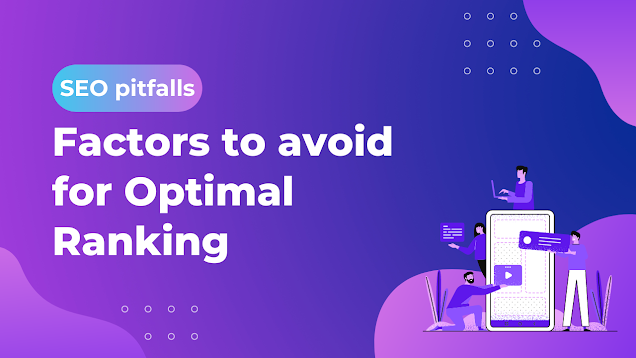Factors to Avoid for Optimal Rankings
SEO Pitfalls: Factors to Avoid for Optimal Rankings
In the competitive world of SEO, achieving top search engine rankings requires strategic planning and thoughtful execution. While understanding what to do is crucial, knowing what not to do can be equally important. Here, we explore some key factors to avoid ensuring your SEO efforts don't backfire:
Content Shortcomings:
- Thin content:Focus on creating informative and valuable content that addresses the user's search intent in detail. Avoid thin content with minimal depth or offering nothing new compared to existing resources.
- Keyword stuffing:While keywords are essential, excessively stuffing them into your content can negatively impact readability and get flagged by search engines. Aim for natural keyword integration that enhances user experience.
- Neglecting mobile optimization: With the majority of internet searches happening on mobile devices, ensure your website and content are optimized for mobile users.
Technical SEO Blunders:
- Slow loading speed: A slow website frustrates users and harms SEO. Optimize images, minimize unnecessary code, and consider website caching solutions to improve loading speed.
- Broken links:Broken links not only hinder user experience but can also confuse search engines and damage your website's credibility. Regularly check and fix broken links throughout your website.
- Ignoring robots.txt and sitemap: These files provide valuable instructions to search engine crawlers. Ensure your robots.txt file accurately informs them which pages to crawl and index, and submit an updated sitemap to help search engines discover new content.
Backlink Blunders:
- Buying backlinks:Engaging in link-buying schemes is strictly against search engine guidelines and can result in penalties. Focus on building high-quality backlinks organically through guest blogging, creating shareable content, and earning mentions from reputable websites.
- Unnatural backlink profile:Having an unbalanced backlink profile with a sudden surge of links or links from irrelevant sources can raise red flags. Build backlinks gradually and ensure they are relevant to your website's content and niche.
- Neglecting internal linking: Properly interlinking your website pages helps search engines understand your website's structure and improves user navigation. Strategically use internal links to connect relevant content and guide users deeper into your website.
User Experience Oversights:
- Poor website design and navigation: A confusing or cluttered website design can drive users away and negatively impact SEO. Prioritize a user-friendly design with clear navigation, intuitive layout, and easy access to important information.
- Ignoring user engagement metrics:Monitor and analyze user engagement metrics like bounce rate, time on site, and click-through rate. These metrics reveal how users interact with your website and identify areas for improvement to enhance their experience and overall SEO performance.
- Neglecting on-page optimization: Optimize your website's title tags, meta descriptions, and header tags with relevant keywords and clear calls to action. This helps search engines understand your content and encourages users to click on your website in search results.
By avoiding these common SEO pitfalls, you can lay a solid foundation for your SEO strategy and pave the way for improved search engine rankings and organic traffic growth. Remember, SEO is a continuous process, so stay informed about the latest best practices and adapt your strategies to stay competitive in the ever-evolving search engine landscape.


.png)

Comments
Post a Comment